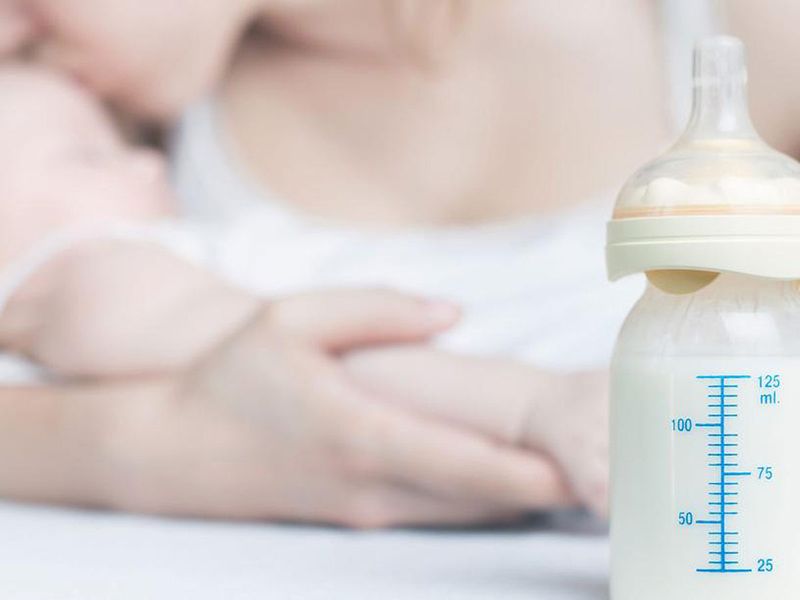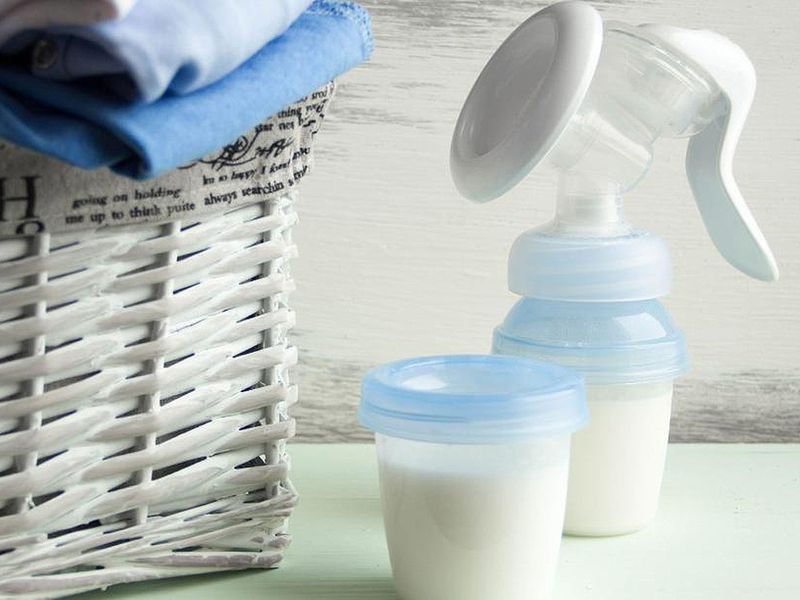
Before my oldest child was born 10 years ago, I wondered what all the breastfeeding fuss was about. Women, I naively figured, were designed to feed their babies. So why would anyone have issues with it?
Then reality struck. Far from being a bonding experience, I found breastfeeding agonising and exhausting. A big and colicky baby, my son also had a super-sensitive gag reflex, which meant more often than not, rather than feed him my breastmilk, I wore it post-digested and Damien Hirst-style.
Depressed, sleep-deprived and with a baby who never stopped crying, I threw in the towel after four months and turned to formula.
Fast-forward to baby number three, and I had breastfeeding cracked. But those initial dark days of struggling with my first child had shown me unequivocally that first-time nursing mothers need kindness, support and assistance – not the threat of legal action should they meet with difficulties.
Apparently, I am not alone when it comes to being defeated by breastfeeding. The World Health Organization (WHO) reports that, “Globally, less than 40 per cent of infants under six months of age are exclusively breastfed. Adequate breastfeeding counselling and support are essential for mothers and families to initiate and maintain optimal breastfeeding practices.”
Indeed, mothers’ forums and Facebook threads across the globe become white hot with debate the moment anyone mentions the breastfeeding clause in the UAE Child’s Rights law. In 2014 the Federal National Council (FNC) approved legislation that announced all ‘able’ women are required by law to breastfeed their babies, by whatever means necessary, for the first two years of life. To not breastfeed could theoretically even result in a husband suing his wife. This at present seems to be a law passed over all UAE citizens, expats and Emiratis alike, adds Shani Dean, midwife and parenting educator from Hatched.ae.
When stripped down to the basics, the clause could well appear alarming to a UAE-based woman due to give birth or who is struggling with breastfeeding. But is there really reason to panic?

“The law is extremely hard to police as currently there is zero data collection in the UAE on breastfeeding rates on children after six months,” says Shani Dean. “It’s almost impossible for the law to be enforced or proven unless mothers were required to be on some form of government register, which would be the first of this type in the world. As it stands the law is unclear about the status of the amount of breastfeeding it requires, as by this stage children are supplemented with solid foods, and other forms of milk and water.”
Midwife and parent educator at Malaak Mama & Baby Care and long-term UAE resident Cecile De Scally also says that mums who are struggling with breastfeeding should not be worried. She believes the regulation is a ‘positive move’ and a step in the right direction for promoting breastfeeding. But, she concedes, much more needs to be done for mothers so they can continue to feed their babies. “To make this law realistic and workable for every mother, more support needs to be implemented.”
Support network
Cecile believes the lawmakers should work with UAE midwives and breastfeeding experts so that the difficulties new mothers are faced with are properly understood.
She explains, “It’s important to recognise the challenges mothers face – such as 45 days’ paid maternity leave. As a long-time business owner, I know it’s not always easy for companies to pay out for mums to take six months out of their jobs. But there are other ways in which the situation could be eased so that returning to full-time work after just six weeks – a time when for many, breastfeeding has only just been properly established – isn’t the only option for new mums.
“Job sharing and offering mothers the option to work part-time would help a lot. More companies could look at flexitime, and even allow mums to work from home if their roles permit it.”
Cecile says companies need to be more accommodating. “It always amazes me that businesses are so unhelpful to feeding mums,” she says. “If you told the CEO of a large corporation he had to eat his lunch in the men’s toilet, he’d be understandably horrified. Yet many nursing women are forced to express breastmilk in the toilets because there are no private spaces for them.”
Shani Dean of Hatched.ae agrees: “The biggest issue facing most women wanting to breastfeed in the UAE, regardless of it now being a law or not, is that if they need to return to work for financial reasons, they must do so within the 45 days paid maternity leave the government provides.
“With such a short leave time, it is very difficult for women to continue to breastfeed their babies unless their workplace provides adequate expressing breaks and private areas for mothers to comfortably do so. Although the UAE labour law does state that a workplace must grant a breastfeeding mother two additional 30-minute breaks in the working day, for a mother to keep her supply up, she must express every three to four hours, so the two laws at present are not complementary of each other.
“A step in the right direction towards supported and prolonged breastfeeding in the UAE would be to introduce more lactation consultants into hospitals and clinics, to provide postnatal home visits by Midwives or lactation nurses to support mothers once at home.”

Read more: Is breastfeeding always best
Improvements in postnatal care
Amy Vogelaar, a midwife and breastfeeding adviser, believes the law cannot be properly implemented until the basics of postnatal care in the UAE have been addressed. “In my opinion, breastfeeding is very important, and anything that helps mothers to do it is a positive thing. But the notion that it would be an enforceable law in the UAE – and that women could be prosecuted for not following it – well, that really surprised me.”
Postnatal support for mothers in the UAE is at best sporadic, says Vogelaar, who points out that there are no national standards when it comes to making sure a mother’s health is OK post-birth, let alone her child’s.
“Very often, first-time mothers deliver their babies, spend the required amount of time in hospital, and are then waved off with a ‘good luck!’ from nursing staff. There are no follow-up home visits in those essential first few weeks after birth, and there are very few properly qualified lactation experts to offer new mums advice and support on breastfeeding.”
But, according to Vogelaar, the problems go deeper than that. She says, “Hospitals in this region have a very high caesarean rate. Experts working in these areas would estimate it is higher than 50 per cent in many hospitals – possibly even as high as 80 per cent. When women deliver by caesarean section, they can find breastfeeding much more challenging because their bodies have been through extreme trauma, which disrupts their hormone levels.
“As well as making feeding their babies very awkward and painful, this hinders milk production. So you have a situation where breastfeeding is made difficult to establish from birth and then hindered by poor-to-zero aftercare for mother and babies.”
Added challenges
“Mothers stop breastfeeding before the two-year mark for many reasons, including going back to work, low supply, baby naturally weaning off, and sometimes because of painful feeding, stress and post-partum depression,” says Shani Dean.
“At times when a baby is diagnosed with severe reflux, or has anatomical abnormalities of the palate, specialized bottles and formulas must be prescribed instead of breastfeeding. “Also mothers who take certain medications such as sedatives, antiseizure medicines, cancer medicines, and medicines that affect the immune system are absolutely discouraged from breastfeeding as the medications can be harmful to the baby.
“Additionally, if a mother becomes pregnant within this two-year mark, she cannot be made to breastfeed her first child all throughout her second pregnancy.” “In short, one blanket rule, for a whole community of different mothers from all around the world in inquire parenting circumstances, cannot work,” continues Shani.
While any promotion of breastfeeding is a positive thing, the fact that mothers could potentially be criminalized for not continuing breastfeeding for two years is problematic, says Shani – although in practice, the law doesn’t seem to be enforced in this way. “The benefits of breastfeeding for as long you can has been recognized as a wonderful way to nourish your child by Health organisations worldwide, but creating a law enforcing it for a set period of time can create a myriad issues and does nothing for the advocacy of supportive mothering choices.
Shani concludes: “A mothers choice and ability to feed her baby, is very unique and individual, and surely the decision of how best to nourish ones child, should be made by the family caring for that child. The law puts a great deal of unnecessary pressure and burden on new mothers who often find breastfeeding a challenge.”
Know your maternity rights
- The new clause in the Child’s Rights Law approved by the Federal National Council (FNC) states that all children of able mothers have the right to be breastfed until two years of age. A refusal to comply with that right could potentially result in prosecution. No measures for enforcing the new clause have been announced as yet.
- Currently, women in six emirates are entitled to a total of 45 days paid maternity leave (calendar days – not working days). A further 10 days of unpaid leave can then be requested. In Sharjah women are entitled to 60 days. UAE companies must provide nursing mothers with up to two half-hour slots per day for breastfeeding for a period of 18 months after their delivery.
- Numerous studies prove breastfeeding for up to two years protects mothers from breast and uterine cancers, and provides infants with health benefits. The WHO (World Health Organization) recommends exclusive breastfeeding for the first six months and supplementary breastfeeding for two years.
There is a wide range of breastfeeding support available to mothers in the UAE:
Breastfeeding Q&A UAE - A Facebook page dedicated to supporting mothers who choose to breastfeed.
La Leche League - A local division of an international non-profit organisation offering support, information and monthly meet-ups for breastfeeding mothers. Email noura.laleche@gmail.com or marieclaire.laleche@gmail.com.
Human Milk For Human BABIES UAE (HM4HB UAE) - An initiative to enable mothers to share breast milk amongst themselves. Find them on Facebook
Read more: 'Solving your breastfeeding challenges'








